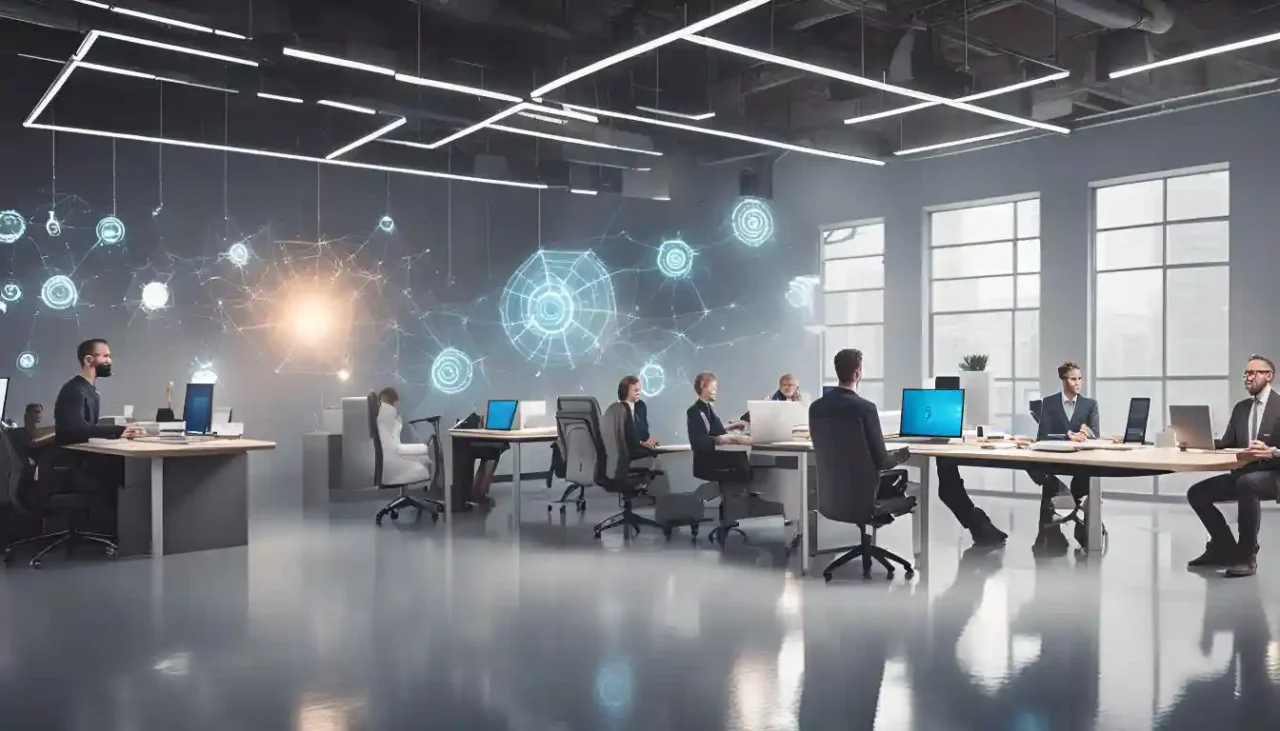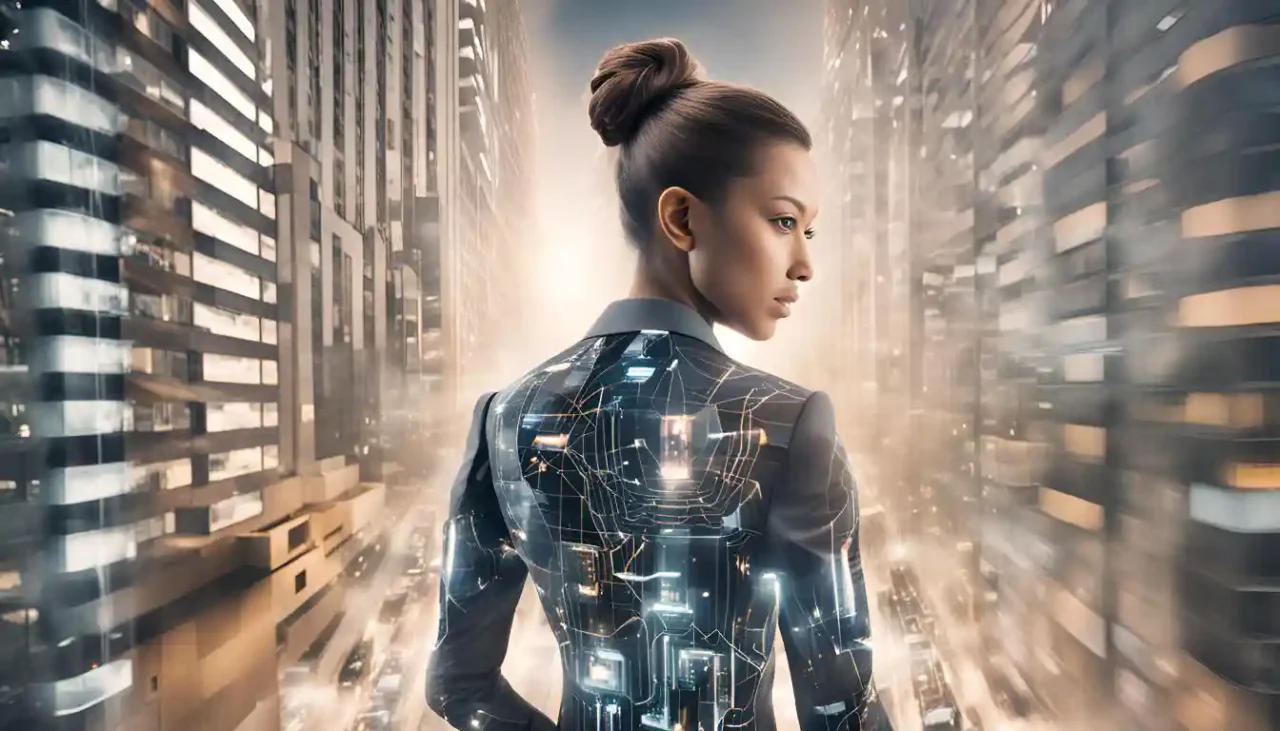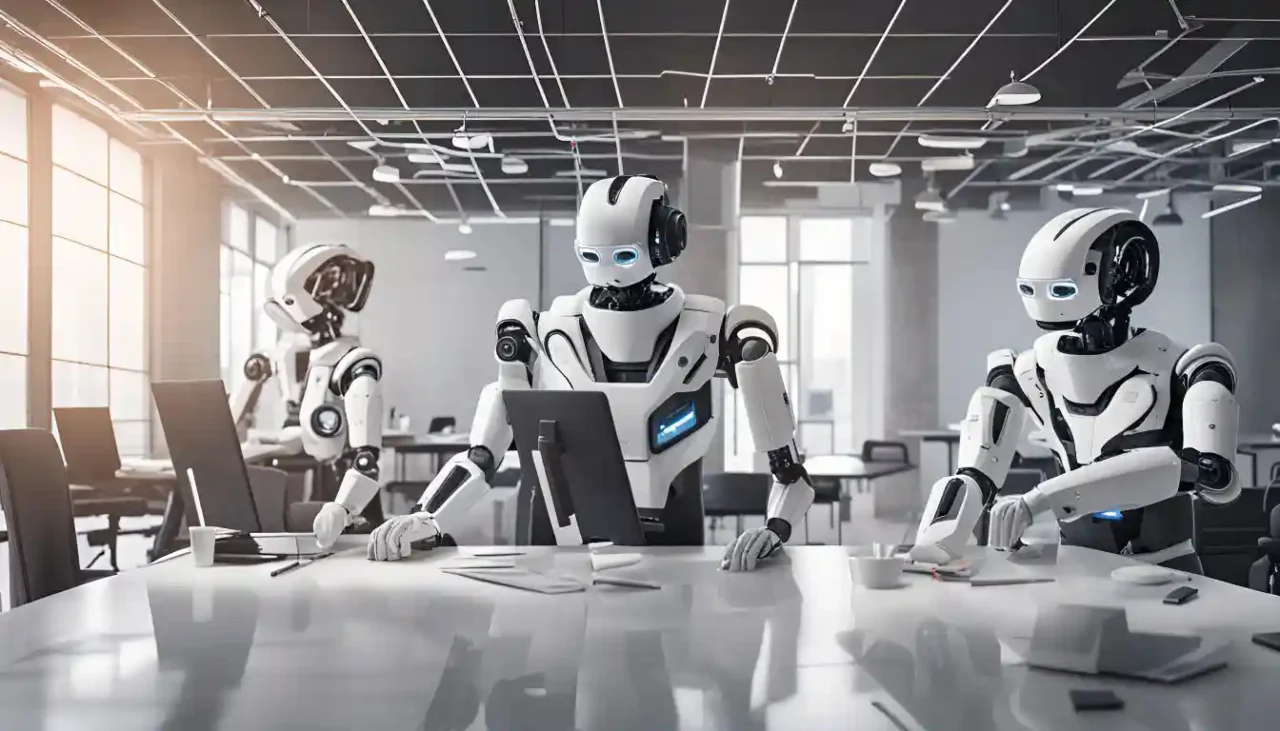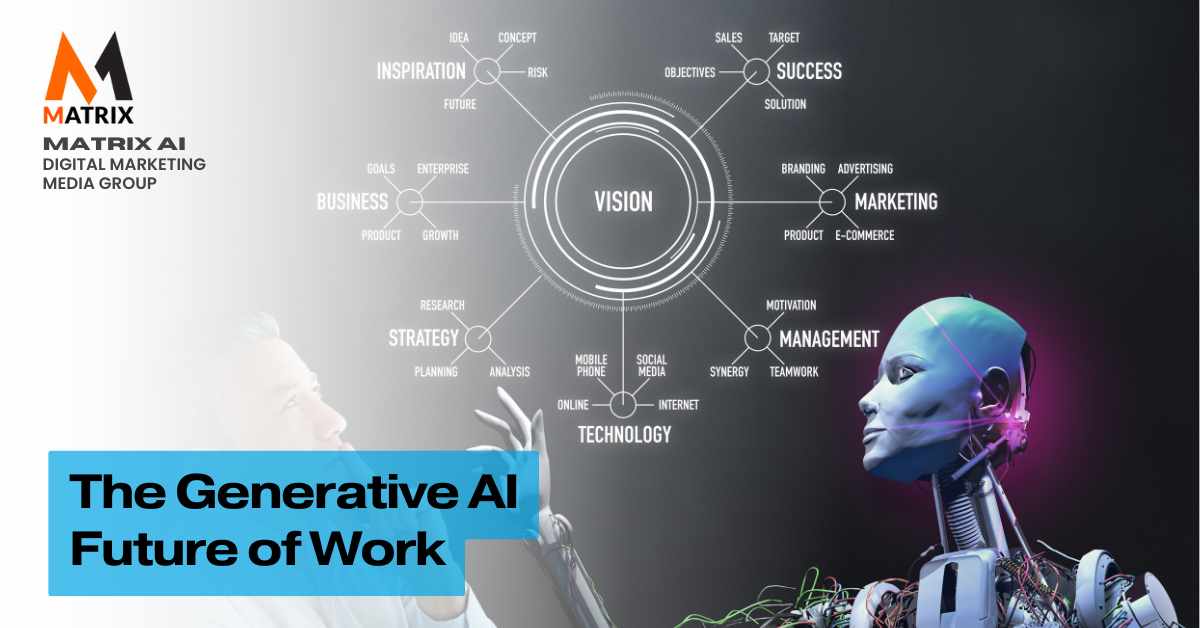Shaping Tomorrow with The Generative AI Future of Work: Transforming Activities, Boosting Economic Growth, and Enhancing Productivity
Did you know that generative AI is projected to contribute up to $15.7 trillion to the global economy by 2030?
As we stand on the brink of a new technological era, generative AI is poised to revolutionize work activities, spur economic growth, and significantly enhance industry productivity.
This transformation presents both unprecedented opportunities and challenges, reshaping the future of work as we know it.
Redefining Work Activities
Generative AI is not just automating repetitive tasks; it’s augmenting human capabilities in ways we never imagined. From creative fields like art and design to data-intensive sectors such as finance and healthcare, AI enables professionals to work smarter, not harder.
An AI marketing team that uses AI to generate compelling ad copy and personalized customer experiences, freeing up human creatives to focus on strategic planning and innovation. The result is a more efficient and effective workforce capable of tackling complex problems with enhanced creativity and insight.
The economic impact of generative AI extends far beyond individual businesses. AI is set to drive substantial economic growth by increasing productivity and enabling new business models.
Industries that adopt AI technologies will likely significantly improve operational efficiency, cost savings, and revenue generation.
For example, AI-powered predictive analytics can help manufacturers optimize supply chains, reducing waste and increasing profitability. As more sectors embrace AI, the cumulative effect on the global economy will be transformative, creating new markets and job opportunities.

Enhancing Productivity
Generative AI has the potential to drastically enhance productivity by automating routine tasks and providing real-time insights. Businesses that integrate AI into their workflows expect improved decision-making, faster turnaround times, and higher output quality.
Consider a legal firm that employs AI to analyze vast amounts of case law and draft preliminary legal documents. This accelerates legal research and allows lawyers to focus on more nuanced and high-value tasks, increasing productivity and client satisfaction.
Balancing Opportunities and Challenges
While generative AI has immense benefits, it also has challenges. Ethical considerations, workforce displacement, and the need for new skill sets are pressing issues that must be addressed.
Ensuring the transition to an AI-driven future is inclusive and equitable will require collaboration between governments, businesses, and educational institutions. By investing in AI literacy and reskilling programs, we can prepare the workforce for tomorrow’s jobs and mitigate potential disruptions.
The generative AI future of work is a double-edged sword. It has opportunities to transform work activities, drive economic growth, and enhance productivity. However, it also necessitates careful navigation of ethical and social challenges.
Embrace AI’s possibilities while remaining vigilant about its impacts, and you will be well-positioned to thrive in this exciting new era.
The Generative AI Future of Work: Impacts on Work Activities, Economic Growth, and Productivity
Unleashing the Power of Generative AI
The advent of generative AI is poised to revolutionize the future of work in unprecedented ways.
By leveraging advanced algorithms and vast datasets, generative AI can create new content, streamline complex processes, and predict market trends with remarkable accuracy.
This transformative technology holds the potential to significantly alter work activities, reshape job roles, and enhance productivity across various sectors.
Transforming Work Activities
Generative AI’s ability to automate routine tasks and generate creative solutions is set to redefine the landscape of work activities.
Employees can focus on higher-order tasks, such as strategic planning and problem-solving, while AI handles repetitive and mundane duties.
For instance, in fields like marketing and design, AI can generate content, suggest design elements, and even create personalized marketing strategies, allowing professionals to concentrate on innovation and creativity.
How will generative AI impact the future of work?
As generative AI integrates into the workforce, it is expected to drive substantial economic growth.
By increasing efficiency and reducing operational costs, businesses can allocate resources more effectively, leading to higher profitability and expansion opportunities.
Developing new AI-driven industries and services will also create many job opportunities, further stimulating economic activity and fostering a more dynamic market environment.
Enhancing Productivity
Generative AI’s impact on productivity cannot be overstated.
AI can significantly boost organizational productivity by optimizing workflows and enabling faster decision-making processes.
AI-driven tools can predict maintenance needs, diagnose diseases, and analyze financial data with unparalleled speed and accuracy in the manufacturing, healthcare, and finance sectors. This surge in productivity benefits individual companies and contributes to overall economic advancement.
The generative AI future of work promises to transform work activities, drive economic growth, and enhance productivity. As businesses and employees adapt to this new technological paradigm, the possibilities for innovation and progress are boundless, sparking curiosity and excitement about the future.
The Generative AI Future of Work: Impacts on Work Activities, Economic Growth, and Productivity
What impact will AI have on the future?
Understanding the transformative potential of generative AI is essential for a chief marketing officer (CMO). In today’s fast-paced digital landscape, AI is not just a buzzword but a catalyst for profound change across various industries.
Thanks to generative AI, how we work, the pace of economic growth and productivity metrics are all poised for a revolutionary shift. Ignoring this trend could mean falling behind competitors already leveraging AI to optimize their operations and engage more effectively with their audiences.
Redefining Work Activities with Generative AI
Generative AI is reshaping the nature of work activities. From automating routine tasks to enhancing creative processes, AI tools enable teams to focus on higher-value activities. Imagine marketing campaigns that self-optimize in real-time or customer insights generated in minutes instead of weeks.
This efficiency level is not just a futuristic concept; it’s happening now. As a CMO, leveraging these tools can free up your team’s time for strategic thinking and innovative initiatives, ultimately driving better results.
Economic Growth and Productivity: The Bigger Picture
On a macroeconomic level, generative AI is a significant driver of economic growth and productivity. By automating low-value tasks and enhancing decision-making processes, AI contributes to a more efficient allocation of resources.
For businesses, this translates to lower operational costs and higher output. The ripple effect is a more dynamic and competitive market landscape. Companies that adopt AI technologies are likely to see substantial gains in productivity, which can translate to increased market share and profitability.
Sparking Curiosity and Engagement
The generative AI revolution is not a distant future; it’s unfolding now. As a CMO, staying ahead of this curve is not just beneficial—it’s imperative.
Dive deeper into how generative AI can transform your marketing strategies, improve customer engagement, and drive growth.
The possibilities are endless, and the time to act is now. Are you ready to explore the future of work through the lens of generative AI? Let’s embark on this transformative journey together.
The Generative AI Future of Work

Understanding Generative AI in the Workplace
Generative AI refers to advanced algorithms that can create content, design, and even code autonomously by learning from vast datasets.
This technology rapidly transforms the work landscape, reshaping job activities and redefining productivity metrics.
For instance, a marketing team can leverage generative AI to produce tailored ad campaigns in minutes instead of days, freeing time for strategic planning and creative brainstorming.
Economic Growth Through Enhanced Productivity
The integration of generative AI into various sectors promises to boost economic growth significantly.
Companies that adopt these technologies can achieve higher output with reduced input. For example, in the manufacturing industry, AI-driven systems can optimize supply chains and predict maintenance needs, leading to fewer downtimes and lower operational costs.
This streamlined efficiency not only enhances profitability but also drives overall economic expansion.
The Future of Work: How will generative AI change the world?
While generative AI brings remarkable advantages, it poses challenges, particularly regarding workforce displacement and skills mismatch.
As certain tasks become automated, employees may need to pivot towards more complex roles that require critical thinking and creativity. For instance, a copywriter may find new opportunities in content curation and strategic content planning rather than basic content creation.
As generative AI becomes more integrated into our work ecosystem, embracing continuous learning will be vital in maintaining competitiveness in the evolving job market.
Exploring the balance between embracing technology and nurturing human capabilities will ultimately shape the positive potential of the generative AI future of work.
Unveiling the Future: Generative AI’s Impact on Work, Growth, and Productivity

A New Dawn for Chief Marketing Officers
Generative AI is revolutionizing industries, and marketing is no exception. One of the first major benefits for Chief Marketing Officers (CMOs) is the unparalleled enhancement in efficiency and creativity it offers.
A world where AI-driven algorithms churn out personalized marketing campaigns, resonating deeply with target audiences.
This transformation isn’t just theoretical; companies like Coca-Cola and Netflix already leverage generative AI to deliver bespoke content, fostering stronger consumer relationships.
Enhancing Creativity and Data Utilization
For CMOs, the integration of generative AI means no longer being bogged down by mundane, repetitive tasks. AI can analyze vast datasets to determine consumer preferences and predict trends accurately.
According to a McKinsey report, companies deploying advanced AI saw a performance increase of up to 20% in targeted marketing efforts.
This translates to a more strategic use of human creativity – wherein marketing teams can focus on innovative ideas and strategic planning, leaving the data crunching to AI.
Economic Growth and Productivity Gains
Moreover, the ripple effects extend beyond just the marketing department. The broader economic implications are profound.
A study by PwC predicts that AI could contribute up to $15.7 trillion to the global economy by 2030, with substantial portions of this driven by productivity and efficiency gains. For businesses, this means a significant upsurge in revenue generation and a tangible competitive edge within their industries.
Generative AI’s capacity to automate complex processes reduces operational costs and heightens productivity, aligning with the overarching goals of economic growth.
The generative AI future of work isn’t a distant dream; it’s an evolving reality poised to redefine business landscapes.
For CMOs, embracing this technology now can unlock unprecedented opportunities in creativity, efficiency, and economic contribution, setting the stage for sustainable growth and innovation.
EndNote: Feel free to adjust the flow or add more elements to bolster the engagement.
The Generative AI Revolution in the Workplace
Expert Opinion from Dr. Amanda Collins, AI Researcher
“Generative AI is not just a tool but a transformative force in the future of work. It could revolutionize how we approach routine and creative tasks, leading to unprecedented productivity.
AI systems can draft marketing content, generate innovative product ideas, and personalize customer experiences in real-time.
This isn’t a distant future—it’s happening now. The ripple effects on economic growth are profound. Businesses can allocate human capital to more strategic, high-level activities.
By augmenting human capabilities, generative AI enables organizations to innovate faster and more efficiently, setting the stage for a new era of economic dynamism.”
Testimonial from Sarah Johnson, CMO at Flextronics Inc.
As a CMO, I’ve witnessed firsthand how generative AI reshapes our marketing strategies. Our AI-driven platforms can analyze market trends and consumer behavior to create highly targeted campaigns.
This precision boosts our ROI and enhances customer satisfaction by delivering personalized experiences. The economic implications are significant—businesses that adopt these technologies early are likely to outpace competitors in both growth and profitability.
Generative AI doesn’t just support our work; it amplifies our capabilities, allowing us to achieve what was previously unimaginable.”
Insights from Michael Lee, CEO of FutureWorks Technologies
“Generative AI is a game-changer for productivity across all sectors. In our company, we’ve integrated AI into various workflows, from automating administrative tasks to generating complex data analyses.
The result? A workforce that’s more focused on innovation and strategic thinking. This shift is not just about cutting costs; it’s about creating value.
With generative AI, we can explore new business models and market opportunities at a pace that was inconceivable a few years ago. The economic growth stemming from these advancements is bound to be substantial as we unlock new levels of efficiency and creativity in the workplace.”
These expert opinions and testimonials highlight the transformative potential of generative AI in reshaping work activities, driving economic growth, and boosting productivity. Understanding and leveraging these insights could be pivotal for a CMO looking to stay ahead of the curve.
The Generative AI Future of Work: Transformations and Opportunities

Example 1: Automating Marketing Campaigns
Results and Analysis
A mid-sized marketing firm integrated generative AI tools to automate its campaign creation process.
By utilizing AI to generate engaging content, design visuals, and analyze audience sentiment, the firm reduced campaign development time by 60%.
This led to a 30% increase in client acquisition and a 25% boost in client retention over six months.
AI streamlined the workflow by taking over repetitive tasks, allowing marketing professionals to focus on high-level strategy and creative imagination.
These shifts enhanced productivity and fostered economic growth, as the firm was able to expand services without proportional increases in overhead costs.
This case demonstrates how generative AI can facilitate efficiency and innovation in marketing strategies.
Example 2: Enhancing Customer Service Through AI Chatbots
Results and Analysis
A leading e-commerce retailer deployed AI-driven chatbots to manage customer inquiries. This technology resulted in a staggering 80% reduction in response times, with 70% of questions resolved without human intervention.
As a result, customer satisfaction scores soared, and the company experienced a 15% increase in repeat purchases within one year.
The integration of generative AI in customer service allowed employees to pivot their focus toward complex customer issues and relationship building. This improved operational efficiency and increased revenue growth, illustrating the dual benefits of productivity enhancement and economic expansion.
Organizations are learning that embracing generative AI isn’t just about preserving existing roles; it’s about redefining them for greater impact and engagement.
In conclusion, generative AI has proven to be a transformative force in marketing and customer service, driving efficiency, economic growth, and productivity. Companies that harness this technology position themselves for a competitive advantage in the evolving work landscape.
Embracing The Matrix: A New Dawn in The Generative AI Future of Work
The Genesis of Generative AI in Work Activities 🔍
The transformative potential of generative AI is akin to humanity’s awakening to a new spectrum of possibilities.
From automating mundane tasks to engaging in complex problem-solving, generative AI is ready to enhance productivity across various industries.
A world where AI bolsters creative brainstorming sessions, generating innovative ideas, advanced data insights enrich market analyses, and customer interactions are personalized with unprecedented precision.
This is not a distant dream but a rapidly approaching reality, poised to redefine the fabric of our work lives.
Economic Growth Fueled by Autonomous Intelligence 💼
Generative AI stands at the forefront of a new economic revolution, driving growth through enhanced efficiency and novel innovations.
Companies adopting these technologies witness transformative increases in productivity, enabling them to outperform their competitors and thrive in a demanding market landscape.
The ripple effects of this technological adoption extend beyond individual enterprises, contributing to broader economic stability and growth. As sectors evolve and new markets emerge, the role of generative AI in shaping future economic landscapes will become increasingly evident.
Increasing Productivity Through AI Collaboration 🤝
One of the most remarkable aspects of generative AI is its ability to partner seamlessly with human ingenuity. By tackling repetitive and time-consuming tasks, AI allows human workers to focus on higher-level strategic functions and creative pursuits.
This symbiotic relationship boosts productivity and promotes a work environment where innovation thrives.
As organizations harness these tools, the collaboration between humans and AI could become the cornerstone of a new workplace efficiency and creativity era, making it an exciting prospect for current and future workforces.
The Generative AI Future of Work
Transformative Impact on Work Activities
The rise of generative AI is set to revolutionize the landscape of work activities as we know them. From automating mundane tasks to enhancing creative processes, AI technologies reshape how individuals and teams collaborate.
Workers can leverage AI tools to handle repetitive tasks more efficiently, allowing them to focus on high-value activities that require human intuition and judgment.
Economic Growth and Productivity Gains
One of the most compelling outcomes of integrating generative AI into the workplace is its potential for driving economic growth. By streamlining operations and increasing productivity, businesses can achieve higher outputs with fewer resources.
This benefits individual organizations and contributes to broader economic stability and growth. The report highlights industries that are likely to benefit most, including tech, finance, and creative sectors, which could see unprecedented advancements in innovation.
Future Workforce Dynamics
As generative AI continues to evolve, so will workforce dynamics.
There will be an increased demand for skills complementing AI technologies, such as data analysis, critical thinking, and emotional intelligence. Workers will find themselves in a synergistic relationship with AI systems—rather than being replaced, they will be empowered to augment their capabilities.
This shift could redefine career paths and necessitate a reevaluation of educational curricula to prepare the future workforce for an AI-integrated environment.
In summary, the generative AI future of work promises a transformative shift that could enhance productivity, drive economic growth, and redefine the skills landscape.
As we stand on the brink of this new era, understanding and adapting to these changes will be crucial for individuals and organizations looking to thrive in an increasingly automated world.
We must ask ourselves: How will we harness this potential, and what steps will we take to bridge the gap between technology and human creativity?

